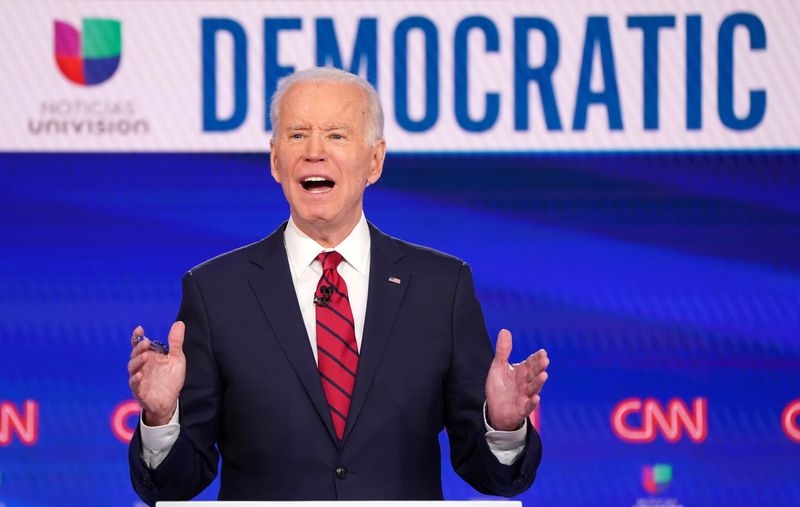By Michael Martina
(Reuters) - President Donald Trump has seized on Americans' growing animosity toward China over the coronavirus outbreak to underpin his re-election pitch, arguing he will hit Beijing harder than anyone.
That is just tough talk hardly substantiated by action, says Jake Sullivan, a senior adviser to presumed Democratic presidential nominee Joe Biden.
Biden's campaign is preparing to roll out policies on how his future administration would better deal with China and will continue to show how Trump is weak on America's top geopolitical and economic competitor, Sullivan told Reuters in an interview.
"The vice president intends to do two things: hold Trump accountable for a catastrophic set of failures in his approach to China, and a colossal gap between tough talk and weak action," said Sullivan, one of several former Obama administration officials who comprise Biden's foreign policy team. Biden served as President Barack Obama's No. 2 for eight years.
On the coronavirus, Biden will keep criticizing Trump for repeatedly praising Chinese President Xi Jinping despite global concerns over a lack of transparency on the severity of the crisis, Sullivan said.
On global alliances, Biden's team argues that Trump is helping China by undermining U.S. relations with traditional allies, and reducing America's role and influence in international institutions.
On the years-long trade war with China, Biden's campaign will highlight its contention that Americans have paid a significant price while getting little in return.
"It's fine for the president to want to push China to make changes," Sullivan said. "But you get judged not by the pushing, but by the changes."
Both candidates are spending millions of dollars ahead of the Nov. 3 election on ad campaigns targeting the other's record on China, which has quickly become a focal point of the U.S. presidential race.
Trump's campaign contends Biden will not be as tough on China, the country the Republican president blames for the pandemic that has killed more than 80,000 people in the United States and saw 20.5 million Americans lose jobs in April. In an email to supporters on Tuesday, the Trump campaign called Biden the "China-loving candidate."
"Joe Biden has a terrible record on China, having coddled them over his four decades in Washington," Trump campaign spokeswoman Sarah Matthews said of Biden, who also served as a U.S. senator.
"President Trump will always hold China accountable for their actions, but Beijing Biden simply can’t be trusted to fight for America’s interests,” she added.
Trump in recent weeks has ramped up his criticism of Beijing and threatened new tariffs, and officials are considering retaliatory measures over the outbreak.
Negative views on China among Americans have grown to the highest levels in 15 years, with two-thirds of people holding an unfavorable opinion of the country, up 20 percentage points since Trump took office, according to a Pew Research Center poll conducted in March amid the coronavirus pandemic.
'LEAVING A VACUUM'
Instead of Trump's America-alone approach to China, Biden would work with like-minded countries to put pressure on the world's No. 2 economy, strengthen technology transfer restrictions and elevate human rights issues to the highest level, Sullivan said.
Democrats say it is a smart strategy to make the election a referendum on Trump's China record, particularly with independent voters who will be critical in a contest likely to be decided by close margins.
A Reuters/Ipsos poll from April 15 to 21 showed 52% of independents disapproved of the president's handling of China, compared with 33% who approved.
Some analysts and China policy experts say Biden eventually will need to provide a detailed vision for how he can do better on China, a task that could be complicated by the legacy of the Obama-Biden administration's China policy.
Chinese leaders had "licked their chops" at the Obama administration's insistence that major global issues could not be solved without their help, said Bonnie Glaser, director of the China Power Project at the Center for Strategic and International Studies.
A Biden administration would need to be careful not to get "bogged down" in political dialogues with Beijing, she said.
Biden raised eyebrows in the foreign policy community last year when he downplayed China's ability to compete with the United States.
Sullivan has acknowledged that getting U.S. allies on the same page to confront China will be no easy task. But he defended Biden's insistence on a multilateral approach to dealing with China, calling it a "soft word" but "not a soft policy."
Putting together advanced market economies to pressure China would be "a hell of a lot better than just the United States choosing to try to fight a trade war with China all by ourself," he added.
He also said Biden would look to expand restrictions on the transfer of technology to China used to facilitate China's detention of a million or more mostly Muslim ethnic Uighurs in the country's Xinjiang region, an issue Biden would raise directly with Xi.
Sullivan said Biden would increase funding for American innovation, education and infrastructure, arguing the Trump administration had ceded ground to China in the race on science and technology.

"Trump is literally leaving a vacuum for China to fill," Sullivan said. "You've got someone in the Oval Office who is fixated on steel, coal and battleships, instead of quantum computing, AI (artificial intelligence) and biotechnology."